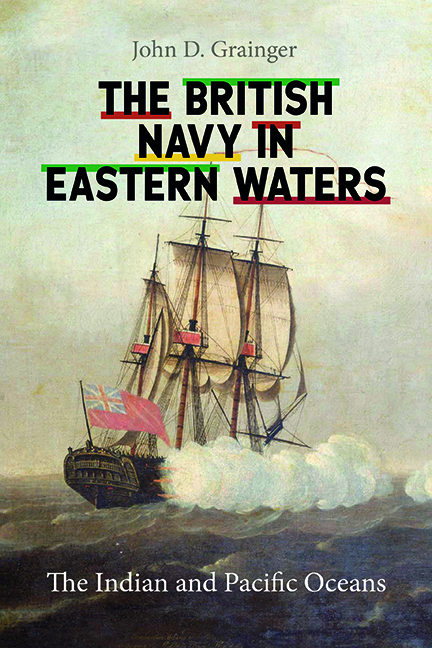9 - Destroying all Rivals (1803–1811)
Published online by Cambridge University Press: 26 May 2022
Summary
The Royal Navy had been able to restrict its presence in the Indian Ocean between 1793 and 1801 to a relatively few ships, even in a time of the greatest European war since the Thirty Years’ War, because it was able to prevent its enemies from sending a major naval force into that ocean. This power lay mainly in its control of the waters of Western Europe, that is, the North Sea and the English Channel, and so preventing access to the French Atlantic ports; from there it could also dominate the North Atlantic and the Mediterranean. As further insurance the approaches to the Indian Ocean had been seized – the Cape, the Red Sea, Penang in the Straits of Malacca, Botany Bay – which not only controlled the ‘entrances’ to the ocean, but prevented the entry of enemies by controlling the means of ships’ refreshment. They also acted as bases from which armed forces could sally. But the essential centre of the whole scheme was India, and its two major British naval bases, the cities of Bombay and Madras.
The peace of 1801–1803 ordered the restoration of some conquests, but, just as the restitution of Malta to the Knights Hospitaller was deliberately delayed until it became a major cause of the new war, so the restoration of Indian Ocean territories deliberately took a long time, and in some cases did not even happen. The Cape was not returned to the Dutch until late 1805; the Dutch also recovered Malacca and the Moluccas. The French were supposed to recover Mahe, Pondicherry, and Chandernagar, but failed to do so in time; even as they prepared to re-occupy these places, and some others in India, they were conscious that these places would be retaken by the British within days of a new war beginning. Their consolation was their continued possession of Mauritius. The Dutch also retained their Indonesian possessions.
The British had meanwhile begun applying the power of a more centralised government in India, but slowly and gradually. This was applied in patches only, but cumulatively, and especially during the rule of Governor-General Lord Mornington (later Marquess Wellesley: 1798–1805).
- Type
- Chapter
- Information
- The British Navy in Eastern WatersThe Indian and Pacific Oceans, pp. 161 - 184Publisher: Boydell & BrewerPrint publication year: 2022

